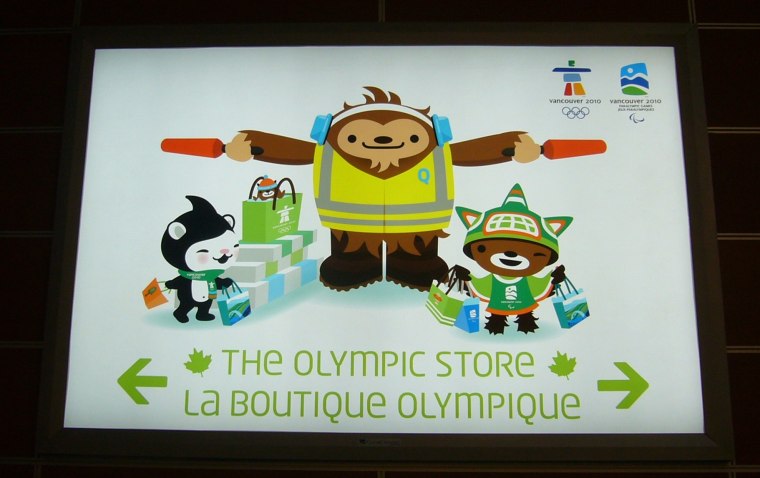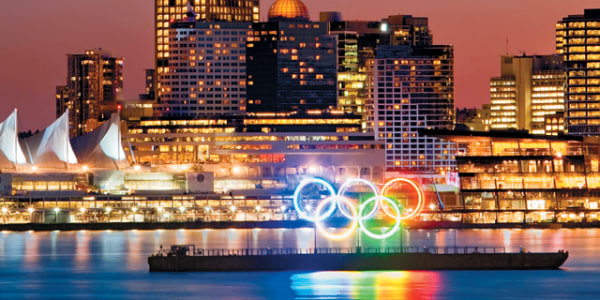The opening ceremony for the 2010 Winter Olympics are just around the corner, and final details are hurriedly being worked out and set in place in downtown Vancouver, up at Whistler and at various venues and attractions throughout the region.
It’s particularly exciting out at the airport.
Vancouver International Airport will be the first stop for more than 230,000 Olympics-bound athletes, officials, coaches, support teams and out-of-town visitors, and it is taking its role as the city’s front door very seriously.
“We’ve been working on this since 2003,” said Paul Levy, the airport’s vice president for 2010 planning. “Ever since it was first announced that Vancouver would host the 2010 Olympic and Paralympic Winter Games.”
To prepare, Vancouver International officials have been traveling to other Games to get a first-hand view of how airports handled the onslaught of athletes and spectators. Levy and his team have gathered tips and advice from airport officials in Sydney, Salt Lake City, Athens and other cities that have hosted previous Olympics events.
Big shopper, big bags, big screens
Logistics for any large event can be complicated, of course, but the 2010 Winter Games bring with them special challenges — and opportunities — for the host airport.
Previous host-city airports advised Vancouver International to keep Olympics-related souvenirs available on site. “They told us, ‘This stuff sells!’ Levy said, “So we’ve had six stores selling Olympics-related merchandise and are making sure we have extra stock stored very near the shops so we can re-stock quickly even when the corridors are crowded.”
Year-round, travelers arrive to Vancouver’s airport with an average of 1.6 bags. However, athletes, Olympics-bound or not, don’t travel light — they arrive with an average of five to seven bags, many of them oversized. In response, the facility purchased extra-large trolleys to help move luggage through the airport.
Visitors will also find a wide variety of helpful amenities and services at the airport. Last July, Vancouver International opened a free, pre-security observation gallery with floor-to-ceiling windows looking out on the airfield, offering complimentary telescopes, interactive kiosks and plenty of comfortable seating.
Slideshow 25 photos
Vancouver, B.C., 2010
The airport, which offers free Wi-Fi, extended the staffed hours at the customer information counters and rolled out a 24-hour over-the-phone translation and interpretation service that can handle more than 170 different languages, including Cantonese, Vietnamese, Urdu, Arabic and French.
And 26,000 members of the airport community, including airport and airline employees, volunteers and staff at many airport shops and restaurants, went through “Get Your Game Face On” training so they’ll be prepared to answer questions posed by Olympics-bound visitors, including how to buy tickets for the Canada Line SkyTrain that links the airport with downtown Vancouver and other towns.
For those spending time inside the airport, there will be entertainment during peak travel periods and plenty of large overhead screens broadcasting Olympics events. The airport has also set aside a special area where fans can participate in the unofficial, but very popular, sport of buying and trading pins.
Failure is not an option
There are plenty of behind-the-scenes safety, security and logistical issues to consider when preparing for the Games. Vancouver International worked in conjunction with airlines and a wide variety of law enforcement personnel to ensure everything goes according to plan.
Mark Southern, Air Canada’s director of station operations in British Columbia, said his team has been running through all possible scenarios of what can go wrong, including baggage belt breakdowns, jet mechanical problems, computer crashes, earthquakes, volcanoes, snow storms and flight crews coming down with the H1N1 virus.
“We think we’re ready to react to anything,” Southern said. “Now my only real worry is that Canada won’t win the gold medal in hockey.”
On the security front, Vancouver International is working with a variety of agencies, including Transport Canada and the Vancouver 2010 Integrated Security Unit (ISU), which is an Olympics-focused blend of police, military and security forces.
The unit has a complex security plan in place that includes “a heightened presence of officers at the airport” and a “continuous gathering of intelligence on issues, both domestic and international,” said ISU’s Joe Taplin.
Grand finale
When all is said and done, the biggest challenge for Vancouver International will actually come when the Games are over. March 1, the day after the closing ceremony, is expected to be its busiest day ever.
“It will be beyond anything we’ve experienced,” Levy said. “Our busiest day to date has been 28,000 people. But on March 1, we expect more than 39,000 people, and their luggage, at the airport.”
But there’s a plan for that, too. On March 1, travelers will be able to check in for their flights at a remote terminal on airport property and then board buses that will take them directly to the gates.
That’s not the only congestion-busting idea, either. Many Vancouver-area hotels have agreed to grant all Vancouver International-bound travelers late checkout so that travelers with late afternoon or evening flights don’t have to pack up their stuff and spend long hours hanging around the airport.
Now that’s an idea that deserves a gold medal.
Harriet Baskas is a frequent contributor to msnbc.com, authors the and is a columnist for USATODAY.com. You can follow her on .

